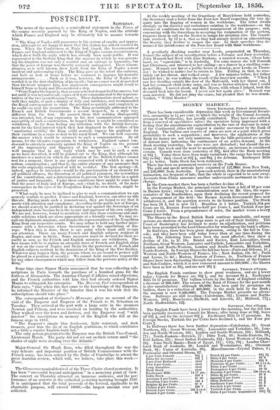POSTSCRIPT.
SATURDAY.
The news of the morning is a semi-official statement in the Tuna, of the course recently pursued by the King of Naples, and the attitude which France and England may be ultimately led to assume towards "The King of Naples still perseveres in his system of cruelty and oppres- sion, although we are happy to know that this system has almost reached its term. When the Conferences at Paris had Closed, the Governments of France and England addressed to the King of Naples certain remonstrances,
which drew forth the v Avhich has already been made public. It was represented to the Sicilian King that the manner in which he was govern- ing his kingdom was not only a scandal and an outrage to humanity, but that the peace of Europe was thereby seriously endangered. These remon- strances, as is well known, drew forth from the King of Naples a most insolent and unbecoming reply. The King gave us the retort discourteous, and bade us look at home before we ventured to impugn his domestic
arrangements Such as it was, however' the King of Naples for- warded it in the first ebullition of his wrath ; but no sooner was it despatched than Ids heart misgave him, lest unpleasant consequences might result to himself from so hasty and ill-considered a step. "From Naples the report is, that as soon as lie bad despatched his answer, but not until it was beyond recall, copies of it were communicated to the represen- tatives of the two great German Courts. These diplomatists stood aghast, as well they might, at such is display of folly and insolence, and recommended the Royal correspondent to undo the mischief as quickly and completely as lie Could—to read his recantation. The King accordingly addressed to the French and British Governments a second despatch, in a style very different fr6m the first. He assured them that nothing disrespectful was intended, but, if any expression in his first communication appeared susceptible of such a construction, he begged that it might be considered as withdrawn. So far from feeling any irritation with the British Govern- ment for the kind interest which they had displayed in the welfare of his ' amatissimi sudditi,' the King could scarcely express his gratitude for their exertions in a cause so dear to his royal heart. We can well conceive the answer which would be returned to such a communication. By all means, let the oflimsive expressions be withdrawn. England cannot con- descend to entertain animosity against the King of Naples on the ground of the impropriety and flippancy of his despatches We can well imagine that in any reply which may be sent to such a note as we have described, it will be pointed out to the King, that although his insolence is a matter on which the attention of the British Cabinet cannot rest for a moment, there is one point connected with it which is open to serious consideration ; and that is, the entire absence of any assurance that the evils originally complained of will be rectified. The beat apology—if, indeed2 apology be intended—would be the proclamation of an amnesty for all pohtical offences, the liberation of all political prisoners, the restoration of the constitution, and a determination to govern for the future in a spirit of justice and humanity. Under these conditions there might be some hope that the peace of Italy and of Europe, and—what is no doubt, of far more consequence in the eyes of the Neapolitan King—hi; own throne, might be preserved. "What reply he may be inclined to give to such a communication we can , scarcely venture to predict. France and England, however, can utter no idle /threats. Having made such a remonstrance, they are bound to see that it meets with attention and compliance. According to the public law of Europe, we should scarcely, be justified in declaring war against the Sovereign of an independent state because he is the tyrant and oppressor of his own subjects. We are not, however, bound to maintain with him those courteous and ami- cable relations which are alone appropriate at a friendly court. We may re- call our diplomatic missions, and dismiss the representatives of the Neapolitan Xing from our respective courts. We may refuse to hold any further inter- course with a Sovereign whose Government is the opprobrium of Eu- rope. When this is done, there is one point which must still occupy our attention. There are many French and English subjects resident at Naples, and some in Sicily. Some measures must be devised for their se- curity as soon as the French and English missions are withdrawn. The best means will be to station an adequate force of French and English ships of war on the coast of Naples and Sicily for the protection of French and English subjects resident in the dominions of the King of the Two Sicilies. Whatever may happen then, the persons whom we are bound to protect will be placed in a position of security. We cannot hold ourselves responsible for any other consequences which may follow from the perverse policy of the King."


























 Previous page
Previous page